

How blockchain is revolutionising the legal sector. New technology trends have a tendency to be all encompassing.

Not only is the latest trend the cheapest, most efficient way to do something, it is also supposedly game-changing for most, if not all, industries. This same hyperbole has been used within the legal sector for blockchain, with the technology promising transformative benefits that are largely yet to become reality. The numerous use cases have been well documented, from smart contracts that mean that if a service isn’t delivered, a customer doesn’t pay, or if it exceeds the contractual parameters of use, it triggers payment, penalties or cessation of service. European Commission Outlines Blockchain Development Plans, Calls For A Feasibility Study And Unveils Fintech Action Plan. The EU Commission continues to show its support and investment in new technologies in the digital economy.

On February 1, 2018, the Commission and the European Parliament launched the EU Blockchain Observatory and Forum, and earlier this month, the Commission also unveiled its FinTech Action Plan. The Blockchain Observatory The observatory is designed to be a comprehensive repository of blockchain expertise and a source of innovation and development. It brings together policymakers, technology experts, regulators, businesses and users with the goal of building on new opportunities offered by the blockchain technology. The initiative forms part of the drive towards the digital single market, a Commission strategy to boost e-commerce, modernize regulations and promote the digital economy. How Blockchain Technology Is Transforming the Legal Industry – Big Law Business. → Automated contract drafting, self-executing legal agreement could save time, lower cost → Blockchain can confirm the existence and authenticity of legal documents, reduce disputes → Lawyers don’t need to be coders, but technology will be an important skill set Blockchain is making its way in to the day-to-day legal practice of major law firms, such as K&L Gates.

It’s not just a technology that law firms are learning about for client matters. Blockchain could become a core way of how the modern legal practice operates. “You don’t need to be doing initial coin offerings or issuing tokens to benefit from the blockchain,” Judith Rinearson, a partner in K&L Gates’ New York and London offices, told Bloomberg Law.
Blockchain—known as the technology underpinning bitcoin—allows for records of transactions to be kept on a digital ledger and shared by everyone in the network. Blockchain and IP law: a match made in crypto heaven? February 2018 By Birgit Clark, Baker McKenzie, London, United Kingdom Blockchain and related distributed ledger technologies have been a hot topic recently, with multiple industries exploring their possibilities and new blockchain use cases emerging almost every day.

But how might these technologies be used in the context of intellectual property (IP) law and practice? What Really Is Blockchain and Why Does It Matter to Lawyers? This is a Guest Post by David Fisher, the founder of legal blockchain company, Integra Ledger, and a co-founder of the Global Legal Blockchain Consortium.
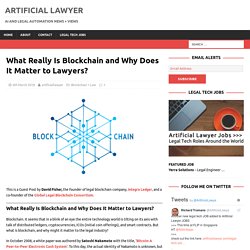
What Really Is Blockchain and Why Does It Matter to Lawyers? Blockchain. It seems that in a blink of an eye the entire technology world is tilting on its axis with talk of distributed ledgers, cryptocurrencies, ICOs (initial coin offerings), and smart contracts. Tech-Savvy Attorneys in Heavy Demand Amid Emerging Tech – Big Law Business. •Clients involved in blockchain, AI, cybersecurity put pressure on firms’ recruiting •States, bar associations revise standards to include tech knowledge Memo to lawyers: free your inner computer nerd if you want to represent today’s clients.
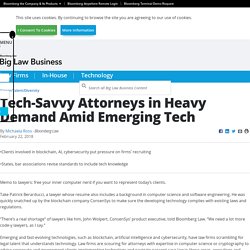
Take Patrick Berarducci, a lawyer whose resume also includes a background in computer science and software engineering. He was quickly snatched up by the blockchain company ConsenSys to make sure the developing technology complies with existing laws and regulations. “There’s a real shortage” of lawyers like him, John Wolpert, ConsenSys’ product executive, told Bloomberg Law. Perkins Coie to Steward Blockchain-Based Self-Sovereign Identity Node. Legal Education in the Blockchain Revolution by Mark Fenwick, Wulf A. Kaal , Erik P. M. Vermeulen. 170928 JDTalks Technology Blockchain. Europe: Blockchain â Practical and legal challenges.
The increasing digitization of the private as well as economic realm is undeniable.
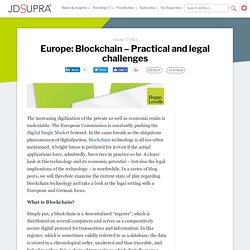
The European Commission is constantly pushing the Digital Single Market forward. Podcast: Changing the Legal Game With Blockchain. Although blockchain is emerging as one of the technologies that will most change the practice of law, many legal professionals still know little about it.
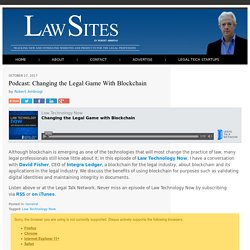
How might blockchain technology revolutionize the legal industry? While Bitcoin may disappear in a few years (doubtful, but possible) its underlining technology is by far the most important development going forward.

Furthermore, I have little doubt that blockchain technology will revolutionize the legal industry in the coming years and that it will be a significant disrupter to the legal profession and the overall market on many fronts. What is blockchain? Blockchain is a public ledger. It can be applied to almost anything that you would normally save to a database or spreadsheet. Take Bitcoin, for example. This public, but encrypted “spreadsheet in the sky” is, in theory, more secure and open than our current system of money exchange. How might blockchain technology revolutionize the legal industry?
Blockchain & Smart Contracts Could Spell Doom for Corporate Law Firms. What is Blockchain and Why It’s Important for Law Practice. You have probably heard of blockchain.
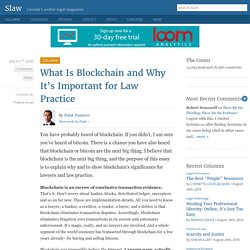
If you didn’t, I am sure you’ve heard of bitcoin. There is a chance you have also heard that blockchain or bitcoin are the next big thing. I believe that blockchain is the next big thing, and the purpose of this essay is to explain why and to show blockchain’s significance for lawyers and law practice. Blockchain is an escrow of conclusive transaction evidence. That’s it. Blockchain was impossible before the Internet. For a trusted conclusive transaction evidence escrow to be the next big thing, it needs to work over any distance, across all borders, with any amounts or assets, without errors or fraud, instantly and with negligible transaction fees. (I am a lawyer and I like lawyers. How Close Are Smart Contracts to Impacting Real-World Law? Josh Stark is a lawyer and head of operations and legal at Ledger Labs, a blockchain consulting firm and development group.
In this opinion piece, Stark focuses on "smart contracts" as an alternative form of legal agreement, speculating on how they could come to impact his industry. Over the last year, the concept of a "smart contract" has received renewed attention in legal and business circles. Advancements in blockchain technology have led some to believe that smart contracts could soon offer alternatives to traditional commercial and financial agreements, with dire results for the legal and financial sectors. While this enthusiasm may be premature, the legal profession nonetheless remains mostly unaware of this important emerging technology and the long-term implications for their profession. On What Law Firms Can Do With the Blockchain.
Editor’s Note: The authors of this post are attorneys at Holland & Knight and are writing a series of articles on blockchain technology and its potential application to the legal industry. Below, the article sets out practical uses of the blockchain and its potential applications in the future. By Joe Dewey, Partner, and Shawn Amuial, Associate, Holland & Knight Over the last four articles, we’ve covered a lot of ground, much of it in an effort to simplify the mechanics of the blockchain and show our readers how this technology will lead to radical changes in our lives — with our focus being on the legal profession.
As we finish up our series, it’s time to answer a question we’ve ignored up until now — what should law firms be doing to leverage these technologies and position themselves to be leaders in a blockchain dominated world? Blockchain Technology Will Transform the Practice of Law. Editor’s Note: The authors of this post are attorneys at Holland & Knight. By Joe Dewey, Partner, and Shawn Amuial, Associate, Holland & Knight There is no shortage of articles written about the application of blockchain technology to the law. 10 Things a General Counsel Needs to Know about Blockchain - ACCDocket.com. Y ou’ve likely heard about bitcoin by now, especially given its ballooning value from US$500 to US$3,000 — all within one year — and similar cryptocurrencies like Ethereum.
You probably know that blockchain is the underlying technology for bitcoin and that the technology can potentially change the world. There is also something called smart contracts. As an in-house lawyer, you should be prepared for when your CEO asks for cost reductions by applying blockchain technology and smart contracts. The Two Topics in Law and Blockchain. Blockchain & Law - Working Group - BlockchainHub. Lawyers Get Ready, There’s a Blockchain Coming. Lawyers have an ethical requirement of competence. Comment 8 to Rule 1.1 of the Model Rules of Professional Conducts specifically refers to technological competence as part of the general duty.
Blockchain 101 for Lawyers Part 1. “The first generation of the digital revolution brought us the Internet of information. New Technology on the Block. In a global economy with increasingly far-flung workforces, companies often need to pay contract workers in other countries. They can do it the conventional way, involving processing an invoice and either cutting a check or collecting and managing direct-deposit data.
How Close Are Smart Contracts to Impacting Real-World Law? Blockchain Technology Will Transform the Practice of Law. Blockchain technology to disrupt financial, legal fields. In 10 years, innovation that's now being nurtured and mined at companies all over the world will have led to enormous changes in how people live their lives and how companies operate, remaking the global economy. That's according to Alec Ross, former innovation adviser to Hillary Clinton during her term as U.S. Blockchain's big opportunity for lawyers. Loaded: 0% Progress: 0% Ashurst partner Phil Trinca said rather than killing off jobs for lawyers, smart contracts and blockchain would open up entirely new fields for legal work.